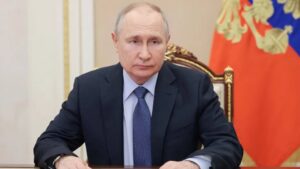
The Russian leader is being pursued for a war crime of “illegal deportation” of children, the judicial institution announced on Friday.
Could Vladimir Putin be tried for war crimes committed in Ukraine? The International Criminal Court (ICC) opened the door to this possibility on Friday, March 17th.
The international tribunal, based in The Hague, Netherlands, issued an arrest warrant against the Russian president for the war crime of “illegal deportation” of Ukrainian children since the beginning of the Russian invasion in late February 2022. Welcomed by the United States, the United Kingdom and the European Union, this decision was described as “historic” by Ukrainian President Volodymyr Zelensky. However, the probability that the Kremlin leader will be arrested is extremely low.
What are the charges stated in the arrest warrant?
Today, March 17th 2023, the Pre-Trial Chamber II of the International Criminal Court issued arrest warrants against two individuals in relation to the situation in Ukraine: Vladimir Vladimirovitch Putin and Maria Alekseyevna Lvova-Belova, Presidential Commissioner for Children’s Rights in Russia, according to a statement released by the ICC (in English). The Russian leader “is alleged to be responsible for the war crime of unlawful deportation of population (children) and unlawful transfer of population (children) from occupied areas of Ukraine to the Russian Federation,” it is detailed.
According to the court, there are “reasonable grounds to believe that Vladimir Putin is personally responsible for the aforementioned crimes”, which would have been committed “on the occupied Ukrainian territory at least from February 24th 2022”. The ICC invokes in its mandate Article 8 of the Rome Statute, its founding treaty, which includes in war crimes the facts of “deportation” or “illegal transfer” of persons.
Can the Russian leader be arrested?
Yes… in theory. The member states of the International Criminal Court (ICC) are obligated to execute arrest warrants against Vladimir Putin and Maria Lvova-Belova if they enter their territory, confirms to AFP the ICC prosecutor, Karim Khan, when asked about the possibility of an arrest of Vladimir Putin if he were to travel to one of the 123 countries that are party to the Rome Statute.
When asked by the Swiss newspaper Le Temps, Andrew Clapham, a professor of international law, went even further. “Article 8 of the Rome Statute means that it is a serious violation of the Fourth Geneva Convention in Article 147,” he noted. This means that Vladimir Putin can be arrested in any country in the world. All states on the planet have ratified the Geneva Conventions, including Russia.
According to Matthew Waxman, professor at Columbia Law School, quoted by AFP, “the chances are slim that Vladimir Putin will ever be arrested”. The first obstacle is material. The ICC does not have its own police force and therefore depends on the goodwill of states. The execution of warrants “depends on international cooperation,” confirms the president of the ICC, Piotr Hofmanski. If the authorities of the states do not act, the court cannot make an arrest. This is how former Sudanese leader Omar el-Bechir was able to travel to several African states in 2017 without being disturbed, despite an arrest warrant issued against him by the ICC.
Ukraine, which is not officially a member of the International Criminal Court, has accepted its jurisdiction in the conflict, allowing it to pursue Vladimir Putin. Russia, however, is not a member of the ICC. In 2016, after the court opened an investigation into the 2008 war in Georgia, Moscow withdrew its signature from the Rome Statute. “Russia, like a number of states, does not recognize the jurisdiction of this court. Therefore, from a legal point of view, the decisions of this court are null and void,” said Russian President spokesman Dmitry Peskov following the announcement of the arrest warrant against Vladimir Putin.
In other words, Russian authorities do not intend to arrest their leader, “unless there is a regime change in Russia,” Cecily Rose, professor of public international law at Leiden University (Netherlands), told AFP. It is therefore highly unlikely that the Russian leader will end up behind bars or convicted, especially since, as attorney Jeanne Sulzer reminded franceinfo in March 2022, “the ICC does not judge an accused in absentia”.
Have heads of state ever been arrested and tried for war crimes?
Yes, several political and military leaders have been tried for war crimes, reminds Karim Khan. “There are so many examples of people who thought they were above the law” and who “ended up in court,” he observes to AFP. Former Ivory Coast President Laurent Gbagbo went to prison after his arrest in 2011, accused of crimes against humanity by the ICC, which eventually acquitted him.
In 2012, the International Criminal Court (ICC) convicted former Liberian warlord and president Charles Taylor of war crimes and crimes against humanity. Six years earlier in 2006, former Serbian president Slobodan Milosevic died in his cell at The Hague while he was being tried for genocide by the International Criminal Tribunal for the former Yugoslavia. In 2008, former Bosnian Serb leader Radovan Karadzic was captured and found guilty of genocide by the same tribunal. His military chief Ratko Mladic was arrested in 2011 and sentenced to life imprisonment.